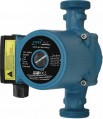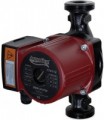Pump type
—
Centrifugal. As the name suggests, this type of pump uses centrifugal force. Their main element is the impeller installed in a round casing; the inlet is located on the axis of rotation of this wheel. During operation, due to the centrifugal force that occurs during the rotation of the wheel, the liquid is thrown from the centre to its edges and then enters the outlet pipe directed tangentially to the circle of rotation of the wheel. Centrifugal pumps are quite simple in design and inexpensive, while they are reliable and economical (due to high efficiency), and the fluid flow is continuous. At the same time, the performance of such units can drop with high resistance in the circuit.
—
Vortex. Vortex pumps are somewhat similar to centrifugal pumps: they also have a round casing and an impeller with blades. However, in such units, the inlet and outlet pipes of the working chamber are directed tangentially to the wheel, and the blades differ in design. The method of operation is also fundamentally different — it uses the vortices formed on the wheel blades. Vortex units are significantly superior to centrifugal units in terms of pressure, but they are sensitive to contamination — even small particles entering the impeller can cause damage, significantly reducing efficiency. And the efficiency of vortex pumps is low — 2-3 times lower than that of centrifugal pumps.
Max. flow
The maximum flow of a pump is the amount of liquid it can pump in a certain amount of time.
Features of choosing the optimal performance option depend primarily on the purpose of the pump (see above). For example, for DHW recirculation models, the pump performance should not exceed the performance of the water heater. If the water heater is capable of delivering 10 litres per minute to the DHW circuit, then the maximum pump performance will be 10*60=600 L/h. The basic formula for calculating the performance of a heating system takes into account the power of the heater and the temperature difference at the inlet and outlet, and for the cold water system — the number of points of water intake. More detailed information about the calculations for each application can be found in special sources, and it is better to entrust the calculations themselves to professionals.
Max. head
The head can be described as the maximum height to which a pump can lift liquid through a vertical pipe without bending or branching. This parameter is directly related to the pressure that the pump produces: 10 m of head approximately corresponds to a pressure of 1 bar (do not confuse this parameter with operating pressure — see more about it below).
The head is one of the key specs for most circulation pumps. Traditionally, it is calculated based on the difference in height between the location of the pump and the highest point of the system; however, this principle is relevant only for units that
boost the pressure of cold water(see "Suitable for"). Circulation pumps for heating and DHW work with closed circuits, and the optimal pressure depends on the total hydraulic resistance of the system. Detailed calculation formulas for the first and second cases can be found in special sources.
Max. power consumption
The electrical power consumed by the pump during normal operation and maximum performance.
This indicator directly depends on performance — after all, for pumping large volumes of water, an appropriate amount of energy is needed. And the power depends on two main parameters — electricity consumption and the load on the power grid, which determines the connection rules. For example, pumps with a power of more than 5 kW cannot be connected to ordinary household sockets; more detailed rules can be found in special sources.

